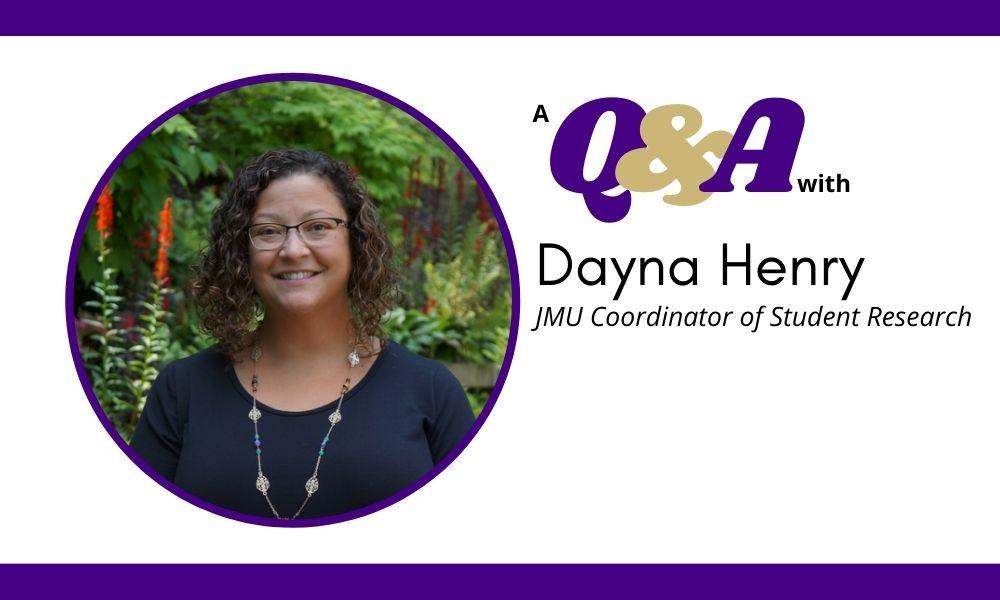Q&A with JMU’s Coordinator of Student Research
Research
Research & Scholarship conducted a Q&A with Dayna Henry, JMU’s inaugural Coordinator of Student Research and faculty member in the Department of Health Sciences.
R&S: What is it about this position that interested you and led you to apply?
Henry: I applied to this position because I believe that all students should have the opportunity to work closely with faculty members. As a first generation college student, doing research or becoming a professor was not a career aspiration for me. This changed when in my junior year my human sexuality professor said he was hiring a research assistant to help him with a textbook over the summer. Since I was working to support myself for school, I saw this as a job opportunity to work on something I was interested in. After working with Dr. Herold that summer reading 1000s of journal articles, pulling the results and suggesting where they might go in the textbook, I fell in love with research. I completed an honors thesis and a master’s thesis even though I was in a clinical training program.
R&S: What are some of the top challenges you are preparing for during your first year?
Henry: Since this is a new position at JMU, the major challenges will be identifying my role and the scope of the work that is possible. Student research is already happening a lot at JMU so getting a picture of the myriad experiences across campuses is a major goal. I hope to talk with faculty, staff, and students about their positive student research experiences and work with them to enhance and expand opportunities across campus.
R&S: JMU previously highlighted some of your efforts to bring research experiences to students through the HTH 408 Research Methods course. What do students enrolled in HTH 408 learn about the research process? How has serving as an instructor for this course prepared you for the Coordinator of Student Research position?
Henry: Students in HTH 408 learn everything about the research process from idea development, IRB and ethics, understanding the existing body of literature, designing a study, collecting, managing, and analyzing data, through dissemination. The goal is to help future health professionals understand how knowledge is created so they can better consume this information as they move into their professional practice. One of the benefits and challenges of such a course is that all majors have the opportunity to complete it. This means we have a wide range of student preparation and interest for engaging with research. I think it’s important for the CSR to consider ways to engage both students who are interested and those who may not know how participating in the research process is beneficial. Part of the role will be helping both faculty and students see the value in student research opportunities, something I do every day in my course.
R&S: Switching to a broader focus across Academic Affairs, how do you see this position encouraging research opportunities for students from diverse backgrounds and in different programs of study (e.g., arts and the humanities, education, business, social sciences, health, STEM, etc.)?
Henry: Studies tell us that students benefit from engaging in student research but access to these opportunities vary depending on a variety of factors including lack of knowledge of the college system and how to identify opportunities, or lack of available time to engage in unpaid additional work. Additionally, faculty and staff who work with students on research should be recognized for the additional time and skill it takes to mentor students through the research process. There are several strategies to reduce these barriers and increase access to research opportunities and as the CSR, I will seek to encourage and support such activities. These include developing both curricular (e.g., courses with a research focus) and co-curricular opportunities, obtaining funding through grants and donations to support both the conduct and dissemination of research, and reducing barriers to finding such opportunities by facilitating a centralized listing of opportunities. Since “scholarship” varies by discipline, having a broad and inclusive conceptualization will also aid in increasing opportunities for students from diverse backgrounds and disciplines.
R&S: Is there anything else you’d like to share with the JMU community?
Henry: I am very excited to begin my role as the inaugural Coordinator of Student Research this summer. I look forward to collaborating with everyone across campus and hope that you reach out to me with your ideas and opportunities related to student research at JMU.
